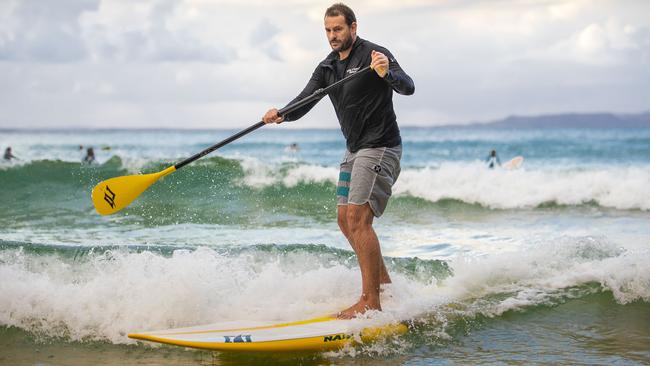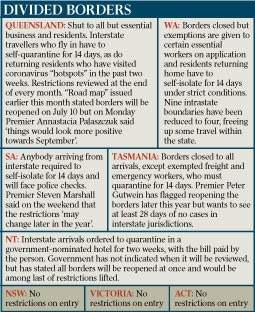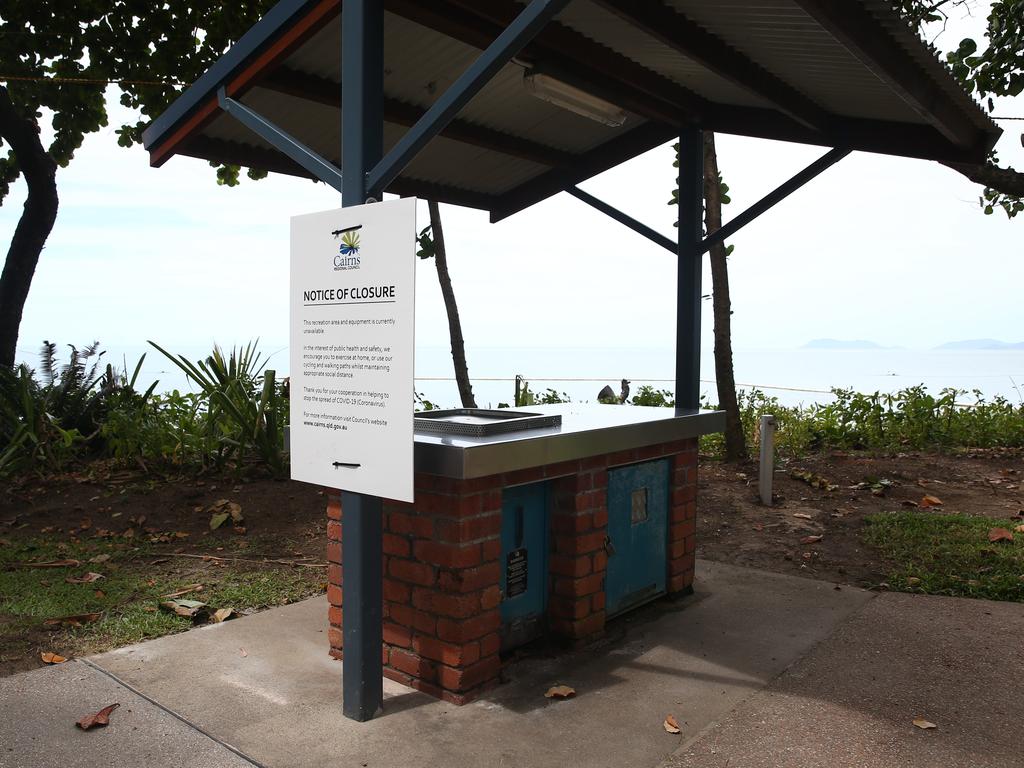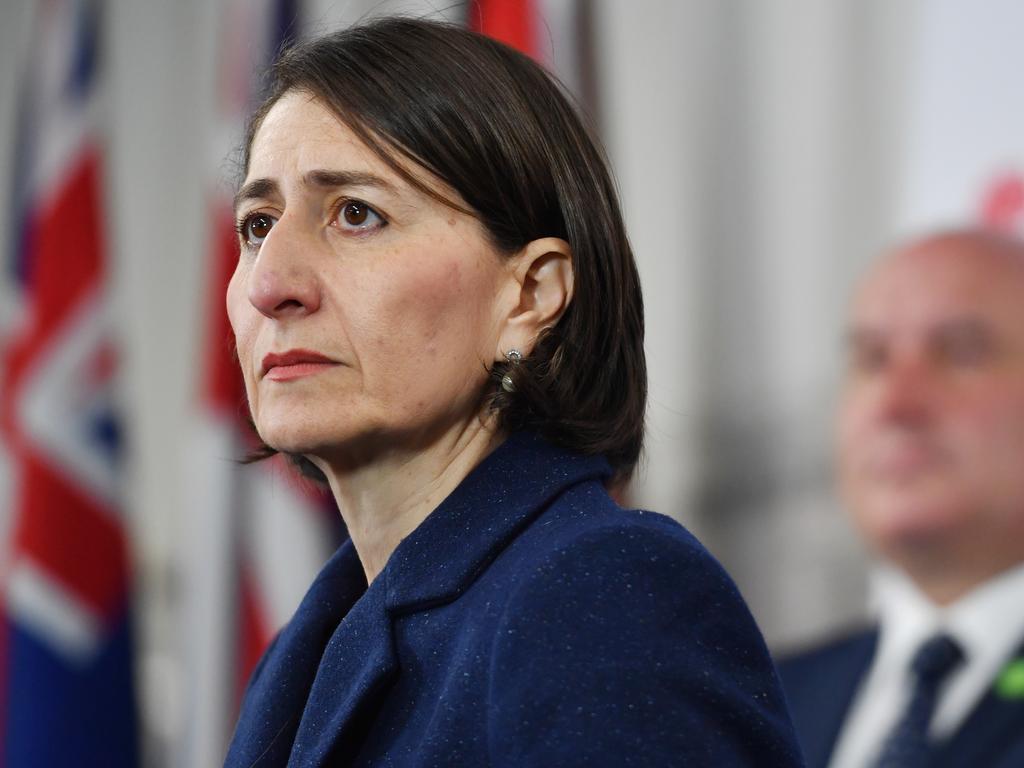Coronavirus: Annastacia Palaszczuk sorry but firm on border bans
Annastacia Palaszczuk apologises to NSW and Victoria residents, but won’t ‘put Queenslanders’ health at risk’ by reopening border.

Queensland Premier Annastacia Palaszczuk has apologised to the people of NSW and Victoria for stopping them from travelling to Queensland, but insisted she would “not put Queenslanders’ health at risk” by reopening the border.
Ms Palaszczuk stunned the tourism sector on Monday by declaring that Queensland’s border reopening “would look more positive towards September”.
Earlier this month, the government’s coronavirus “road map” set a July 10 date for the possible restart of interstate travel.
Ms Palaszczuk said she would review the border closure at the end of each month, and if everything went to plan, people would be able to travel within Queensland by July 10.
But she said she was following Chief Health Officer Jeannette Young’s advice that NSW and Vctoria needed to record two incubation periods – or up to four weeks – of zero cases for the border to reopen, because of the presence of community transmission in those states.
“I will not put Queenslanders’ health at risk, full stop,” Ms Palaszczuk told parliament.
“I apologise to the people of NSW and Victoria, we would love to have you to Queensland, but not at this stage.”
Opposition leader Deb Frecklington used parliament to accuse Ms Palaszczuk of giving “confusing mixed messages” on the border plans.
It comes amid warnings Australia’s $80bn domestic tourism industry faces collapse if state borders remain closed throughout the lucrative winter holiday season, with operators fearing inflexible travel restrictions will cripple the market for years to come and cost tens of thousands of jobs.
As well as Queensland, Western Australia and South Australia — states that draw enormous numbers of tourists from May to September — have signalled it is possible their borders won’t reopen before the end of winter, adding to industry concerns that millions of potential holiday-makers will abandon plans to travel interstate.
Last year, 2.2 million interstate overnight visitors travelled to Queensland in winter months, spending more than $1.5bn.
Computershare founder Chris Morris, who owns a string of luxury tourism businesses in north Queensland, and Flight Centre chief executive Graham “Skroo” Turner said the tourism industry would be flattened if borders did not reopen for interstate tourists for the winter season.
In WA, tourist hotspots such as Margaret River are expected to be largely empty this winter, after Premier Mark McGowan reiterated on Monday that his priority was to oversee the recovery of the state’s “intrastate economy”.
Western Australia had 515,000 overnight visitors from interstate in the September quarter last year.
Mr McGowan said the state’s border with the rest of Australia would be one of the final coronavirus restrictions to be eased.
South Australian Premier Steven Marshall has also refused to bend to the pleas of his state’s tourism operators to reopen the borders, potentially denying regions such as the Barossa Valley hundreds of millions of dollars in holiday business over winter.
“We don’t want to give up on all the hard-earned gains we have made,” Mr Marshall said on Sunday. “We don’t have any intention of opening up our borders at the moment. That may change later in the year.”
Federal Tourism Minister Simon Birmingham urged the states to relax border controls as COVID-19 infections fell. “If one or two states were to hold out, they will be answerable to their tourism industry and will need to provide additional support to that industry,” Senator Birmingham told Sky News on Monday.
Ms Palaszczuk insisted the call to keep the border closed was based on advice from state Chief Health Officer Jeannette Young, but federal Deputy Chief Medical Officer Paul Kelly said the state’s closure “doesn’t make sense”.
“I’ve never believed it’s been necessary to shut them down but the actual shutting down, and therefore the reopening, will be a decision by the elected governments of the particular states,” Professor Kelly told ABC radio on Monday night. “It doesn’t make a lot of sense to me, to be honest, but that’s a decision for the Queensland government.”
Josh Frydenberg warned last week that reimposing restrictions — equivalent to those in place before the three-stage recovery plan was announced on May 8 — would cost Queensland’s economy $800m a week, WA’s $500m, SA’s $200m, Tasmania’s $100m and the Northern Territory’s $40m.
Mr Morris’s Orpheus Island resort, north of Townsville, was booked out for July.
The business had reopened reservations after the federal government released its written “road map” for easing restrictions, which set the July 10 date for interstate travel “subject to further planning and review”.
He said 90 per cent of the island’s bookings were from NSW and Victoria and described Ms Palaszczuk’s announcement as “an absolute disgrace” that would “put a lot of people out of work”.
“We opened it (bookings) when we had that disclosure that that was going to happen,” Mr Morris said.
“If there’d been a huge outbreak or something and they decided not to open it (the border), then all these people would understand.
“We’ve done everything since then: hiring people, taking bookings. It makes us look stupid and it makes Queensland look silly.”

Mr Morris said it was not viable to reopen his businesses without interstate markets. His luxury retreat Mount Mulligan, west of Cairns, could be closed for a year if it was not able to open for the peak winter season, his helicopter business, Nautilus Aviation, was operating with reduced staff, and his Townsville casino, The Ville, would lose interstate business.
Mr Morris, who employs hundreds of people at his tourist ventures, has stood down most of his staff because of the social restrictions but was looking at rehiring in the next few weeks. “I’ve had 200 applications for jobs in the past week,” he said. “I’ll have to write to everyone to say sorry.”
Mr Turner said the Queensland tourism industry would take years to recover if it did not reopen to interstate visitors for the winter season. “It is obvious it will be a disaster for Queensland’s economy,” he said. “Queensland can’t afford that. Queensland will probably not recover from it for years and years if it goes on for more than a few months.”
Ms Palaszczuk’s apparent revision of her post-coronavirus “road map” caught her Tourism Minister, Kate Jones, off-guard, as well as struggling travel operators who were gearing up for the annual influx of southerners escaping the winter cold for Queensland visitor hot spots of Cairns, the Whitsundays, the Sunshine Coast and the Gold Coast.
Ms Jones is understood to have been shocked by the Premier’s new timeline, telling industry leaders she believed the July plan still stood.
Ms Palaszczuk’s announcement also earned the ire of NSW Premier Gladys Berejiklian, who said of Queensland’s border closure: “It doesn’t help Australia, it doesn’t help any of the states, and it doesn’t help our population, It doesn’t help economic activity.”
Ms Palaszczuk said she wanted to welcome as many people to Queensland as possible, but “we just can’t do that at the moment”.
“So we know people want certainty, they want to come to Queensland, it is a safe place to be and, of course, our tourism operators are absolutely looking forward to welcoming people back.
“They have been probably one of the hardest hit sectors — one in 10 jobs in Queensland is in the tourism sector.”
Dr Young said the best-case scenario for reopening interstate travel would be July but it was “very, very unlikely” — the advice that she had given Ms Palaszczuk.
She said NSW and Victoria had to “get their problems sorted” and there needed to be no new community transmission for two incubation periods — four weeks — for the border to be reopened.
“(Ms Palaszczuk) said September, I’m sure she’s correct and I’m wrong,” Dr Young said. “It would be very hard to see (that) interstate travel would be in place in July, that’s the absolute earliest.”
Queensland Tourism Industry Council chief executive Daniel Gschwind said some tourism businesses would not survive an extra two months without interstate visitors. “Many businesses are teetering on the edge and they ¬really need some life support … we are watching this with a significant state of anxiety,” he said.
“Cairns, for instance, is not even hibernating, it’s withering. We appreciate it’s a health crisis we are trying to solve but it really does come at a life-threatening cost to business.”
Additional reporting: Rosie Lewis Richard Ferguson Paul Garvey







To join the conversation, please log in. Don't have an account? Register
Join the conversation, you are commenting as Logout